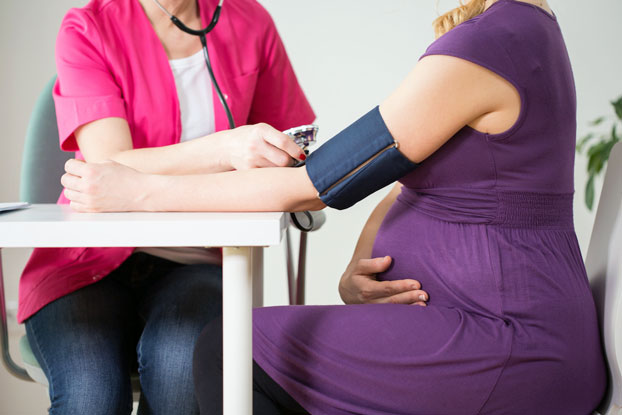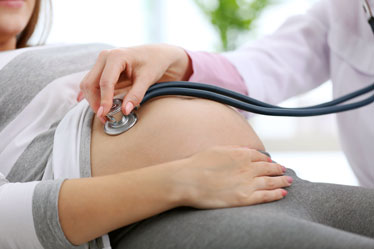Every expectant mother hopes for a healthy, trouble-free pregnancy, but sometimes pregnancy can become complicated and pose serious health concerns to women and their babies. A pregnancy is considered high-risk whenever it threatens the health of the mother or the fetus, but regular prenatal care can reduce some health risks and give women and babies the best chance at a healthy and safe delivery.
Factors of a High-Risk Pregnancy
There are a variety of reasons a pregnancy might be considered high risk. Pregnancy is physically demanding and the mother’s health, age, genetic background, and lifestyle choices are all consequential factors that contribute to the safety level of a pregnancy.
Pre-existing Conditions
Certain health disorders can become further complicated during pregnancy and endanger the health of mother and the fetus:
- Autoimmune diseases. Sometimes women may find that their symptoms improve with pregnancy, but autoimmune diseases such as multiple sclerosis, lupus, and active Crohn’s disease can increase chances of miscarriage or make carrying a pregnancy to term physically difficult. Additionally, certain medications that treat autoimmune diseases may harm a developing fetus.
- Diabetes. High blood sugar can cause developmental defects in the earliest stages of gestation and unchecked diabetes can create significant and even life-threatening health problems for both mothers and babies.
- Thyroid disease. Unmanaged thyroid disease can cause issues with fertility and lead to birth defects, low birth weights, and fetal heart failure.
- Kidney disease. Women suffering from kidney disease often struggle with infertility and experience higher rates of miscarriage.
- HIV/AIDs. Women with untreated HIV/AIDs suffer from many dangerous health complications and can pass the disease on to their babies. However, treatment and Cesarean section delivery significantly decrease the chance of mother to child transmission.
- Polycystic Ovarian Syndrome (PCOS). Women with PCOS may struggle with infertility and experience higher rates of miscarriage.
- High blood pressure. Pregnant women with uncontrolled high blood pressure are at an increased risk for developing additional health problems and have a higher chance of giving birth to babies with low birth weights. Women with a history of high blood pressure are also at a greater risk for developing the dangerous pregnancy condition, preeclampsia.

Maternal Age
- Teen pregnancy. Adolescents are at an increased risk of developing high blood pressure and anemia during pregnancy and they have higher rates of preterm labor.
- Advanced Maternal Age. Women who are aged 35 or older experience more complicated pregnancies on average, especially if it is their first pregnancy. Women who are considered to be older by gestational standards have higher incidences of having babies with birth defects or genetic disorders and are more likely to experience difficulties in labor and have higher rates of cesarean sections than the general population.
Infertility
Women who require medical assistance to aid conception experience higher rates of miscarriage.
Multiples
Women who are pregnant with more than one fetus at a time have an increased chance of preterm delivery and giving birth to babies with low birth weights.
Mom’s Weight
Being underweight or overweight can cause complications in pregnancy. Women with a Body Mass Index (BMI) of 30 or above are at a risk of developing diabetes and preeclampsia, and their babies have an increased chance of being born with rare birth defects including spina bifida and other neural tube defects. Obese women may also have difficulty coping with labor and are more likely to require a cesarean section.
Women with a BMI of 18.5 or below are considered to be underweight and have higher incidences of miscarriage, particularly in the first trimester. They also have a greater chance of delivering an underweight baby.
Lifestyle Choices
Pregnant women who consume alcohol, tobacco products, or recreational drugs pose serious health risks to themselves and the fetus, including birth defects, developmental delays, and low birth weights.
The Importance of Prenatal Care
 The diagnosis of a high risk pregnancy can be frightening and a cause for worry, but it is not a reason to despair. The best way to treat a high risk pregnancy is for women to receive regular prenatal care. Many of the health conditions that cause high risk pregnancies can be determined before conception or early in the pregnancy with an ultrasound and specialized testing.
The diagnosis of a high risk pregnancy can be frightening and a cause for worry, but it is not a reason to despair. The best way to treat a high risk pregnancy is for women to receive regular prenatal care. Many of the health conditions that cause high risk pregnancies can be determined before conception or early in the pregnancy with an ultrasound and specialized testing.
Early diagnosis and intervention can reduce the risk of a pregnancy to a mother and the developing fetus, and regular fetal surveillance can help high-risk pregnancy specialists monitor a complicated pregnancy and lessen the possibility of health emergencies.
Women who think they are at increased chance of having a high risk pregnancy should talk with their healthcare provider before getting pregnant so they can prepare in advance to have the healthiest possible pregnancy for their particular medical situation.
If you have any questions about high-risk pregnancy, please contact Kansas City ObGyn today at This email address is being protected from spambots. You need JavaScript enabled to view it. or 913-948-9636 to schedule a visit.






